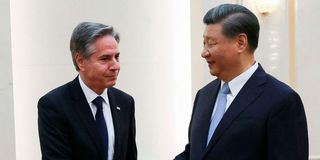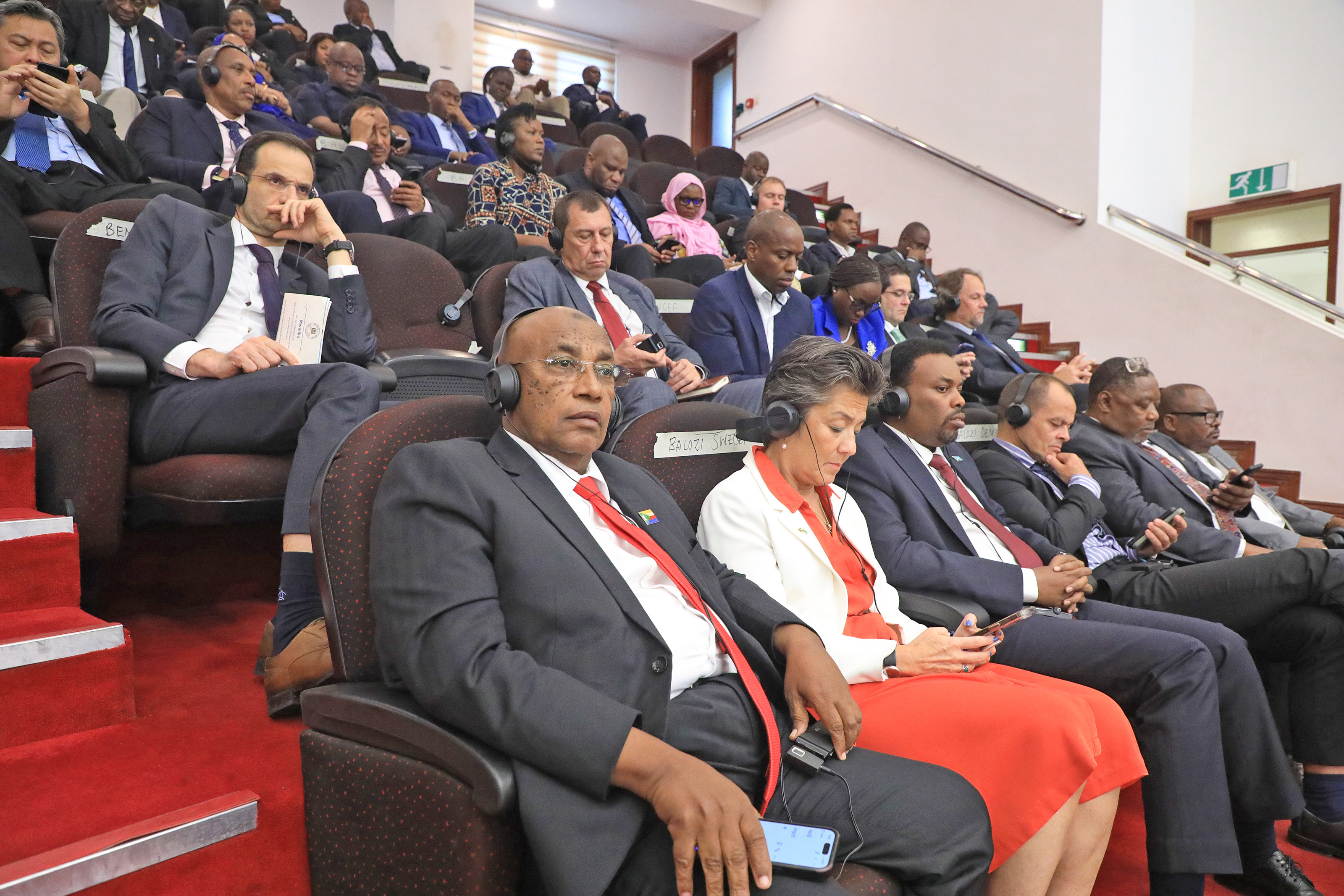Why China is outpacing America in the scramble for African trade

US Secretary of State Antony Blinken (left) shakes hands with China's President Xi Jinping at the Great Hall of the People in Beijing on June 19, 2023.
What you need to know:
- Over the last two decades, China has emerged as the undisputed market leader in Africa, with America belated playing catch-up.
The pangs of a ‘New Cold War’ between the United States and China are hard to ignore. It is the renowned French philosopher, Baron de Montesquieu, in his classic, The Spirit of the Law (1748) who told us that: “Commerce is a cure for the most destructive prejudices.” Montesquieu went further to posit that “Peace is the natural effect of trade,” declaring that “the spirit of commerce unites nations”.
In stark contrast to Montesquieu’s thesis that trade brings peace, tensions between the world’s two largest economies have taken the form of ‘trade wars’ resulting from extreme protectionism and imposition of tariffs and other trade barriers.
The visit to China by the US Secretary of State Antony Blinken in mid-June marks a significant step in re-establishing better channels of communication when US-China relations are at a low point. But Blinken’s “high-stakes” visit can hardly ease superpower tensions over trade. In 2018, former President Donald Trump launched a trade war with China, eventually slapping tariffs on more than $300 billion worth of imports. President Joe Biden has stuck to the Trump-era economic policy of imposing tariffs on imports of Chinese goods.
Africa is the eye of the stormy Sino-American trade wars. Over the last two decades, China has emerged as the undisputed market leader in Africa, with America belated playing catch-up.
It is against this background that China, through its Ministry of Commerce and the Government of Hunan Province, is hosting the 3rd China—Africa Economic and Trade Expo (CAETE) that kicks off in the city of Changsha, Hunan, on June 29, 2023, under the theme ‘Common Development for a Shared Future’.
China has become a prized trading partner that Africa cannot ignore. China has been Africa’s biggest bilateral trade partner since 2009 when it overtook the US. With the most populous consumer class globally estimated at 899 million people by 2023 and expected to reach one billion people around 2026/2027, China has the world’s largest market which Africa needs. Last year, China’s trade with African countries reached a record high of $282 billion. Clearly, Sino-Africa trade, not aid or debts, is driving development in Africa.
Fabulously rich
By the same token, China has found Africa hard to ignore as a new frontier of global trade. Africa is fabulously rich in strategic natural resources. The continent is home to about 30 per cent of the world’s mineral reserves, 12 per cent of its oil and eight per cent of global natural gas reserves.
These include 40 per cent of the world’s gold and up to 90 per cent of platinum and chromium. Moreover, Africa has more than 60 per cent of cobalt, tantalum and other minerals propelling the digital economy and underpinning energy storage technologies. With 60 per cent of the world’s remaining arable land, Africa is the new frontier of global food security. Its population, expected to reach 2.5 billion by 2050, is potentially the world’s largest and youngest market.
In Africa, China is pursuing Montesquieu’s thesis that trade begets peace—and development too. Its message is crystal clear: trade creates jobs, spurs prosperity and lifts people out of poverty. Beijing has unfurled the lessons of its audacious market reforms and trade liberalisation since 1979, which have enabled it to lift more than 850 million people out of poverty!
There are reasons galore why China has become the undisputed market leader in Africa — and why America and others are playing catch-up. First, from the outset, China trained its focus on opportunities, not challenges in Africa’s emerging but volatile markets.
Second, as the West wrote Africa off as a ‘hopeless continent’, China seized the limitless opportunities provided by countries recovering from conflict to expand its commercial footprint.
Third, Beijing embraced Africa as an emerging market where competition is less stiff and easier to invest in than in other competitive global markets. Its investors took a long view of trade and profitability, expecting moments of uncertainty and putting their business on hold rather than pulling out.
Brand-conscious
Fourth, China deciphered the 21st-century African consumer as extensively travelled, brand-conscious and sophisticated, and tailored its market strategies accordingly. It has targeted low-income consumers, recognising that the bottom of the pyramid is the future of the market in Africa. Sixth, China avoided painting Africa with one brush, instead taking into account the peculiar challenges and opportunities in each of the 54 countries.
Sino-Africa trade is soaring on a new architecture of development cooperation continentally based on the Forum on China-Africa Cooperation (FOCAC) and globally linked to China’s multitrillion-dollar infrastructure project, the Belt and Road Initiative (BRI).
The Nobel economist laureate, Joseph E. Stiglitz, rightly observed that: “In developing countries, lack of infrastructure is a far more serious barrier to trade than tariffs.” Through this architecture of development cooperation, China has funded infrastructure to connect the continent to global trade networks and supply chains.
Over the past two decades, China has invested more than $155 billion to build and upgrade more than 10,000 kilometres of railways, nearly 100,000 kilometres of highways, more than 1,000 bridges and 100 ports, and 66,000 kilometres of power transmission and distribution. This infrastructure has opened up Africa for trade and investments.
However, a lingering trade imbalance in China’s favour has forced Beijing to adopt a range of measures to rebalance its trade relationship with Africa. First, it has signed bilateral trade agreements with African countries to remove tariffs and other trade and non-trade barriers. Second, Beijing is diversifying and increasing its import of agricultural products from Africa. At the Dakar conference, President Xi Jinping announced China’s intention to raise imports from Africa to $300 billion per year by 2024, up from $100 billion in 2022.
Third, China is supporting Africa’s industrialisation to add value to African exports. More African countries are connected to China’s Silk Road E-commerce Initiative.
Trade promotion is one of the nine programmes proposed under the China-Africa Cooperation Vision 2035. In this context, China pledged $10 billion to boost African exports and has supported the secretariat of the African Continental Free Trade Area (AfCFTA).
Evidently, China is outpacing the US in the new scramble for Africa. But for the continent, which accounts for only one per cent of world trade, to be fully African integrated into the global trade and supply chains, it has to play its cards well.
Prof Kagwanja is the CEO of the Africa Policy Institute. This article is an excerpt from a paper prepared for the ‘Third China-Africa Economic and Trade Expo’ in Changsha, Hunan, China, June 29-July 12, 2023.




